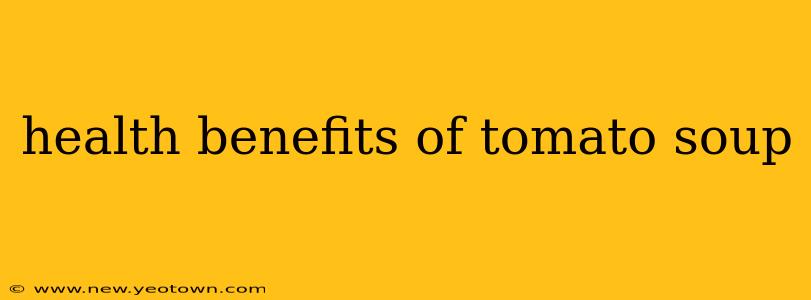Tomato soup. The comforting classic, a childhood favorite, a quick weeknight meal. But beyond its delicious simplicity, lies a surprising wealth of health benefits. This isn't just about warming your belly on a chilly evening; it's about nourishing your body with a surprisingly potent potion of vitamins and antioxidants. Let's dive into the vibrant world of tomato soup and discover why this seemingly simple dish deserves a place in your healthy eating plan.
What are the main health benefits of tomato soup?
The key to tomato soup's health benefits lies within the humble tomato itself. Packed with lycopene, a powerful carotenoid antioxidant, tomatoes boast impressive disease-fighting properties. When tomatoes are cooked, as they are in soup, the lycopene becomes even more bioavailable – meaning your body can absorb and utilize it more effectively. This leads to a boost in several key areas:
-
Heart Health: Lycopene's antioxidant power helps protect your cells from damage caused by free radicals, reducing the risk of heart disease. Studies have linked higher lycopene intake to lower blood pressure and improved cholesterol levels.
-
Cancer Prevention: Numerous studies suggest a correlation between increased lycopene consumption and a reduced risk of certain cancers, including prostate, lung, and stomach cancers. The antioxidant properties combat cellular damage linked to cancer development.
-
Eye Health: Tomatoes contain lutein and zeaxanthin, carotenoids crucial for maintaining eye health. These nutrients protect against age-related macular degeneration and cataracts. A warm bowl of soup is a delicious way to support your vision.
-
Improved Skin Health: The vitamins and antioxidants in tomatoes contribute to healthy skin. Lycopene, in particular, may help protect against sun damage and promote a youthful complexion.
-
Rich in Vitamins and Minerals: Beyond lycopene, tomatoes provide a good source of Vitamin C, Potassium, and Vitamin K, all essential for overall health and well-being.
Is tomato soup good for weight loss?
This is a question with some nuance. Tomato soup can be a part of a weight-loss diet, but it depends on how it's prepared. A homemade version with minimal added cream, butter, or salt will be a much healthier, lower-calorie option than a creamy, restaurant-style soup. The fiber in tomatoes also contributes to satiety, helping you feel fuller for longer. However, it's crucial to be mindful of portion sizes and overall calorie intake.
Is tomato soup good for your gut?
The fiber content in tomatoes contributes to a healthy gut microbiome. Fiber acts as prebiotic food, nourishing the beneficial bacteria in your gut. A healthy gut is linked to improved digestion, immunity, and overall well-being. However, if you have digestive sensitivities, be mindful of added ingredients like onions or garlic, which can exacerbate issues for some individuals.
What are the potential downsides of eating tomato soup?
While generally healthy, tomato soup does have some potential downsides:
-
Acidity: Tomatoes are acidic, so individuals with acid reflux or heartburn may need to consume it in moderation or avoid it altogether.
-
Sodium Content: Many commercially produced tomato soups are high in sodium. Opt for low-sodium options or make your own at home to control the salt content.
-
Allergies: While rare, some people are allergic to tomatoes.
Can tomato soup help with inflammation?
The antioxidants in tomatoes, particularly lycopene, possess anti-inflammatory properties. This means they can help reduce inflammation throughout the body, contributing to better overall health and potentially mitigating the risk of chronic diseases.
Is it better to eat fresh tomatoes or have tomato soup?
This is a matter of personal preference and convenience. While fresh tomatoes offer certain advantages, cooked tomatoes (like those in soup) offer a higher concentration of bioavailable lycopene. Both are beneficial and can be incorporated into a healthy diet.
In conclusion, a warm bowl of tomato soup is far more than just comfort food. It's a delicious and nutritious way to boost your health, from protecting your heart to supporting your skin and eyes. By choosing low-sodium, homemade versions, and being mindful of portion sizes, you can enjoy this classic dish as part of a balanced, healthy diet.

